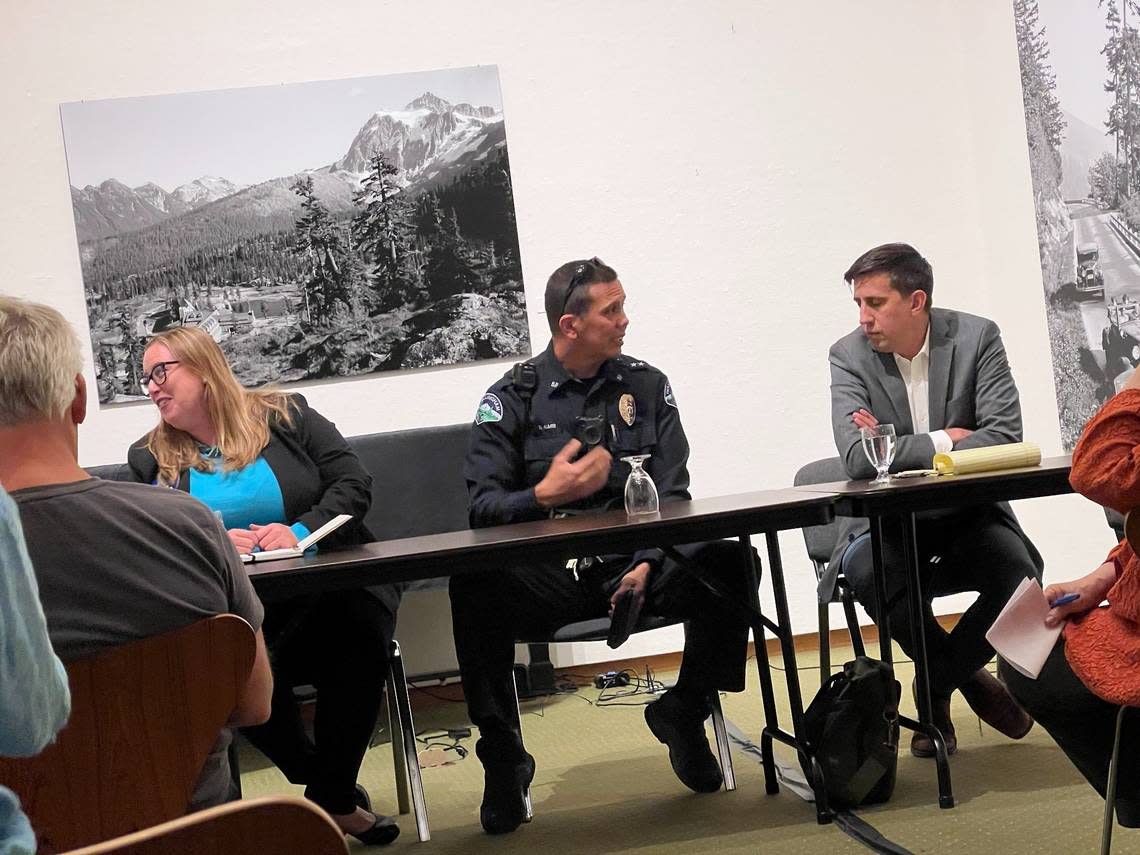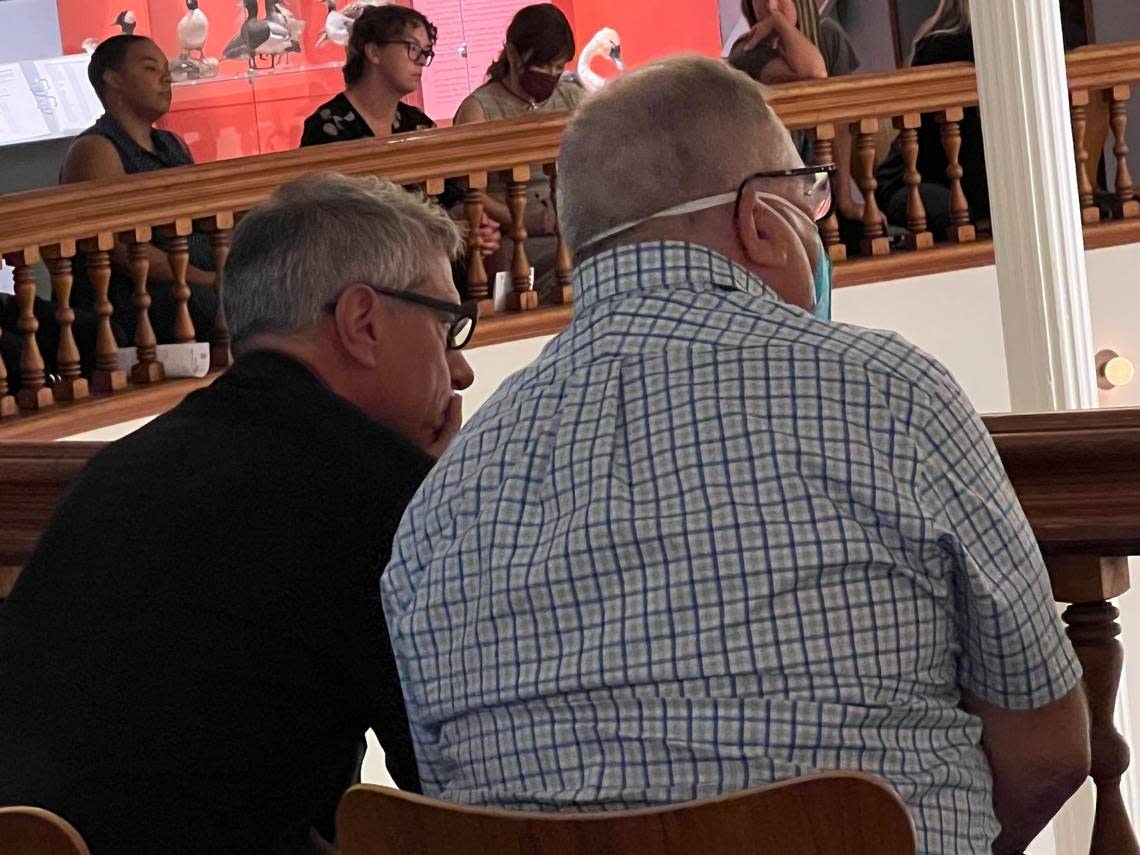Town Hall offers these issues at play in rising downtown Bellingham crime
A series of events mostly driven by the COVID-19 pandemic hit downtown Bellingham as hard as the opening of Bellis Fair mall in 1988, when several major businesses moved, speakers said at a forum addressing crime, drug use and homelessness.
Hosted by a business group called the Downtown Bellingham Partnership, the 90-minute town hall session featured elected leaders and key city officials who discussed the pandemic’s aftermath and took questions from the audience of about 150 people at the Whatcom Museum’s Old City Hall on Tuesday, Sept. 20.
“It’s feeling untenable,” said Kate Groen, co-owner of the Horseshoe Cafe, as she described violence, drug-dealing and loitering near her restaurant in the heart of downtown.
Several key elected leaders attended the meeting, including 42nd District Republican state Sen. Simon Sefzik, Whatcom County Prosecuting Attorney Eric Richey, and Bellingham Mayor Seth Fleetwood. The 42nd District includes Bellingham’s Central Business District.
Panelists included Malora Christensen, response systems manager for the Whatcom County Health Department; Whatcom County Sheriff Bill Elfo; Deputy Chief Don Almer of the Bellingham Police Department; and state Reps. Alicia Rule and Alex Ramel.
Fairhaven resident Elaine Woods told The Bellingham Herald that she attended because the catalytic converter was stolen from her car, part of the pandemic crime wave.
“Nothing is seeming to be done about this type of theft,” Woods said.

Ramel, a Bellingham Democrat who represents south Bellingham and the rest of the 40th District in Washington’s part-time Legislature, told The Herald in an interview before the meeting that he appreciated the chance to discuss the issues that are contributing to a rise in crime and other societal troubles.
“I think it’s good for people to see their elected leaders talking to each other,” Ramel said.
“What we’re seeing ... this has happened across the country — red states and blue states,” he said, citing key reasons for the rise in crime:
▪ The Washington state Supreme Court ruling in State v. Blake decriminalized simple drug possession in 2021.
▪ Limits on jail bookings because of space limits and pandemic precautions.
▪ A backlog of court cases caused by the pandemic.
▪ Pandemic limits on evictions.
▪ Lack of access to mental health services and addiction treatment because of the pandemic.
“All of those factors play into what we’re seeing with crime,” he said.
Ramel’s full-time job is climate policy adviser for Stand.Earth, with offices downtown, and he said he understands the issues that residents and business owners were describing.
Rule, a mental health counselor, also works downtown.
“We’ve been broken into. My employees have experienced safety concerns. This hits very close to home,” said Rule, a Blaine Democrat who represents north Bellingham and the rest of the 42nd District.
Rule and Elfo criticized a series of laws passed during the 2021 legislative session that were aimed at police accountability but instead have limited law-enforcement officers’ ability to detain suspects.
“We have emboldened criminals and people who have a criminal mindset,” Rule said.
Ramel said that lawmakers wanted to restrict police use of force in the wake of the 2020 murder of George Floyd, but agreed that some measures were enacted too hastily, and they were revised in the 2022 session.
“There are other issues at play emboldening criminals right now,” including the Blake decision, the court backlog, and jail booking limits, he said.

Almer said that Bellingham Police had limited their own use of certain methods of arresting a suspect, including choke holds and high-speed car chases, even before the 2021 series of new laws.
Further, he said Bellingham officers get more than four times the state-mandated hours of implicit bias training.
Bellingham’s most pressing issue is a severe shortage of officers, which Almer said was caused by a large number of recent retirements, difficulty hiring, and Fleetwood’s 2020 vaccine mandate, according to previous Herald reporting.
Meanwhile, Bellingham and Whatcom County have begun several efforts to address homelessness, mental health and drug addiction, Christensen told the crowd.
Those include the Mobile Crisis Outreach Team, Ground-level Response And Coordinated Engagement, and Community Paramedic programs, along with the new Alternative Response Team, where 911 dispatchers are sending “low-acuity nonviolent calls” to mental health professionals and others instead of armed police, she said.
Elfo said that building a new jail is his priority.
Funding measures failed at the ballot box in 2015 and 2017, and third attempt is likely next year.
“At this point, I really don’t care where it’s located, we just need to get the darn thing done,” he said to solid applause from the crowd.
Afterward, several people who attended told The Herald that they better understand the scope of the problem that city and county officials are facing.
“I was pretty impressed by the panel,” said Gary Snyder of Bellingham.
“I don’t know if I fully realized how bad the situation was. I’ve certainly realized that mental health is a huge part of this,” he said.
